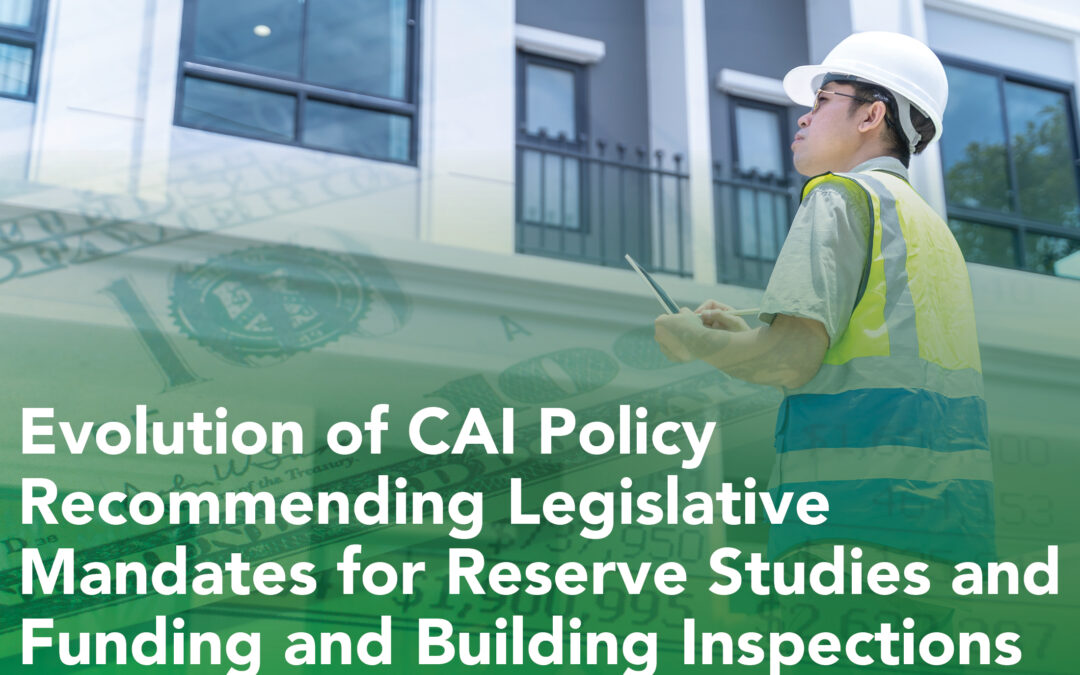Taking a bold new stance following the tragic partial collapse of Champlain Tower South in Surfside, Fla., in late June 2021, CAI now recommends statutorily mandating reserve studies and funding for all community associations. The recommendation also provides details to help communities prepare for and a timeframe to practically transition to these new requirements to avoid financial strain on homeowners and the association. The updated reserve study and funding public policy can be read here.
In addition, CAI public policy now recommends additional inspection requirements by developers during the development process and prior to transition to homeowners, as well as periodic inspections post-transition. CAI collaborated with developers on these recommendations. Structural integrity is addressed through statutorily mandated building inspections starting when the building is 10 years old, another inspection at 20 years, and every five years thereafter. Inspections are based on the American Society of Civil Engineers’ (ASCE) published protocol for building inspections. The new building maintenance and structural integrity public policy can be read here. These policy updates were published in October of 2021.
For almost 40 years, CAI’s established reserve public policy encouraged self-governance and regulation of reserve studies and funding by individual associations rather than mandates in state law.
Upon reviewing established policy following the tragic partial collapse of Champlain Tower South, CAI’s reserve public policy task force and Government & Public Affairs Committee decided to update the policy to recommend both reserve studies and the funding of an association’s reserves be mandated in state law.
Immediately after the Surfside tragedy, CAI convened three specialized task forces to explore changes to laws and best practices for the community association housing model that could help other communities prevent a similar event and provide solutions for legislators nationwide addressing building safety in their districts.
These task forces focused on (1) reserve studies and funding; (2) building inspections and structural integrity; and (3) insurance and risk management issues related to condominium safety. More than 600 people participated in a three-month process to identify clear recommendations through conversations, surveys, research, and interviews. CAI brought together reserve analysts, attorneys, insurance and risk management professionals, developers, engineers, architects, community association managers, and homeowner leaders to provide their expertise. Outreach was also made to experts in a wide range of disciplines and from numerous organizations to help inform these recommendations.
On Oct. 31, 2021, CAI’s Government and Public Affairs Committee made these recommendations related to condominium safety to CAI’s Board of Trustees:
- Reserve Studies and Funding: To update CAI’s established reserve study and funding public policy, initially established in April 1983, and last updated in August 2012.
- Building Maintenance and Structural Integrity: To establish a new CAI public policy on building maintenance and structural integrity.
The CAI Board of Trustees approved the recommendations, and we remain committed to condominium safety, structurally sound and fiscally responsible communities through public policy outreach and legislative advocacy efforts.
Building Maintenance and Structural Integrity Policy Next Steps
Conversations around safety have continued to grow and more data has been collected on aging infrastructure. New critical details relevant to the policy not initially addressed are now being reviewed by a CAI building maintenance and structural integrity policy task force. This task force will likely add policy recommendations related to façade maintenance, inspections, and safety to the policy in the fall of 2023. The current public policy on building maintenance and structural integrity can be found here.
When an issue arises that impacts members, CAI develops a public policy to guide volunteer advocates and staff in advocacy efforts. Any current members can propose a public policy for consideration. CAI public policies are created through a careful and ongoing process that reflects the interests of members, volunteers, and experts. The public policy positions are vetted by CAI chapters, state legislative action committees, member representation groups, and the College of Community Association Lawyers (CCAL), with final approval by the CAI Board of Trustees.
CAI believes these recommendations should be considered for adoption into state law to support the existing statutory framework for the development, governance, and management of community associations. The full Condominium Safety Public Policy Report: Reserve Studies and Funding, Maintenance, and Structural Integrity is available here.
For a full range of CAI’s data and resources related to condominium safety, visit www.condosafety.com.



